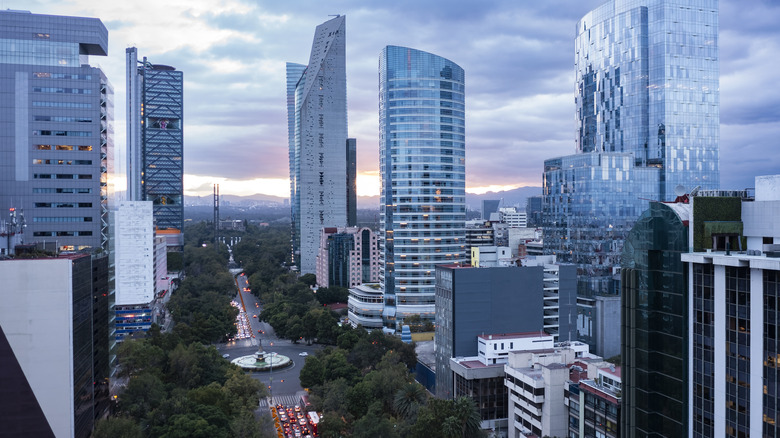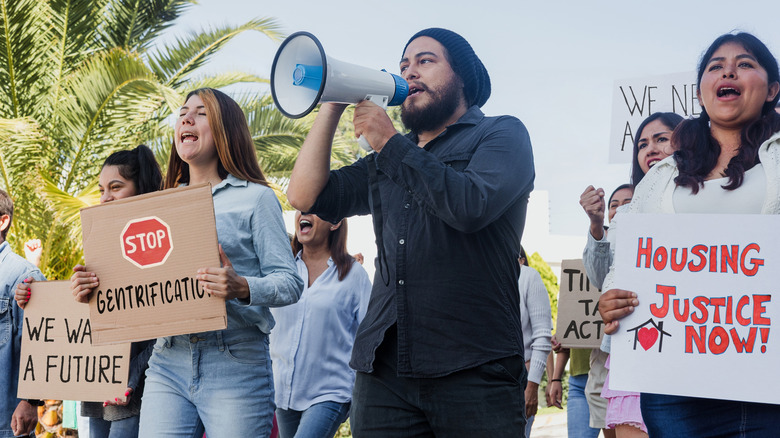
If you've planned a vacation these last couple of years, then you aren't immune to the issue of overtourism. Some of the most "overtouristed" places in Europe have had to undergo measures to combat the influx
of tourists onto their shores. Cannes, for example, has banned large cruise ships and excess tourists from entering the city, while Italy has slapped entry fees to access Venice and imposed stricter check-in rules for Airbnb users. Price increases, gentrification, and a flood of short-term rentals geared toward tourists are some symptoms of overtourism, and Mexico City is the latest cosmopolitan Latin city to succumb to this unfortunate trend.
But Mexico City locals weren't always averse to people coming to their city. During the COVID-19 pandemic, a wave of foreigners moved to the Mexican capital, drawn by its looser restrictions and cheaper living costs. In 2022, then Mayor (and now President) Claudia Sheinbaum positioned Mexico City as a digital nomad destination through a partnership with UNESCO and Airbnb that would, according to an Airbnb press release, "help develop and showcase curated cultural and creative Experiences on Airbnb in less touristed neighborhoods" and create "UNESCO-led trainings to develop authentic cultural experiences" with Mexican entrepreneurs.
Did the plan work? It did, but maybe a tad too well for its citizens' liking. The city that was once intent on courting digital nomads is now dealing with the aftermath of overtourism. Initially, centrally located neighborhoods like Roma and Condesa flourished under the agreement, prompting the arrival of new establishments like cafes and co-working spaces. However, locals were priced out of their own communities as housing prices soared well above their means. Additionally, the proliferation of Airbnbs and other short-term rentals has also excluded citizens from living in their own city, with tenants preferring to rent to foreigners willing to pay more than average.
Read more: The 13 Most Beautiful Destinations In The World Sadly Ruined By Overtourism
Why Locals In Mexico City Want Digital Nomads To Leave

Gentrification has also been a cause of frustration for Mexico City residents, who have seen the arrival of foreign establishments like Starbucks or Popeyes pop up around their neighborhoods, which have driven up the cost to live centrally. But while protests that occurred in Mexico City in summer 2025 were aimed at the foreigners causing gentrification, overtourism, and housing issues, a 2024 analysis published in the peer-reviewed journal PNAS suggests that "displacement and gentrification predominantly originate from government policies and politics." Under the pressure of the protests, Mexico City has introduced a plan to establish more affordable housing options to mitigate the effects of gentrification, per Mexico News Daily. Additionally, though Mayor Clara Brugada Molina condemned violent protests against gentrification in an X post, she has acknowledged the problem by calling for a cap on rental prices and announcing a housing program that would give rental priority to both the young and elderly, workers, or evicted families earning below the minimum wage.
Though the protests of overtourism can put a damper on your travel plans, it's hard to resist the call of Mexico City. So, how can one visit without exacerbating the situation? Instead of booking an Airbnb, try supporting traditional, locally managed guest houses or hotels. Don't contribute to the tourist numbers in the already-crowded city center, and base yourself instead in the city's lesser-known neighborhoods. Coyoacán, just 20 minutes away by car from heaving Condesa, is refreshingly calm (and hosts the Frida Kahlo Museum), or venture even farther to Xochimilco, the "Venice of Mexico" with floating gardens, island markets, and boat rides. Don't be one of those tourists who disrespect Mexican culture in general; come with an open mind and try to leave a good impression on the locals.
Ready to discover more hidden gems and expert travel tips? Subscribe to our free newsletter for access to the world's best-kept travel secrets.
Read the original article on Islands.












